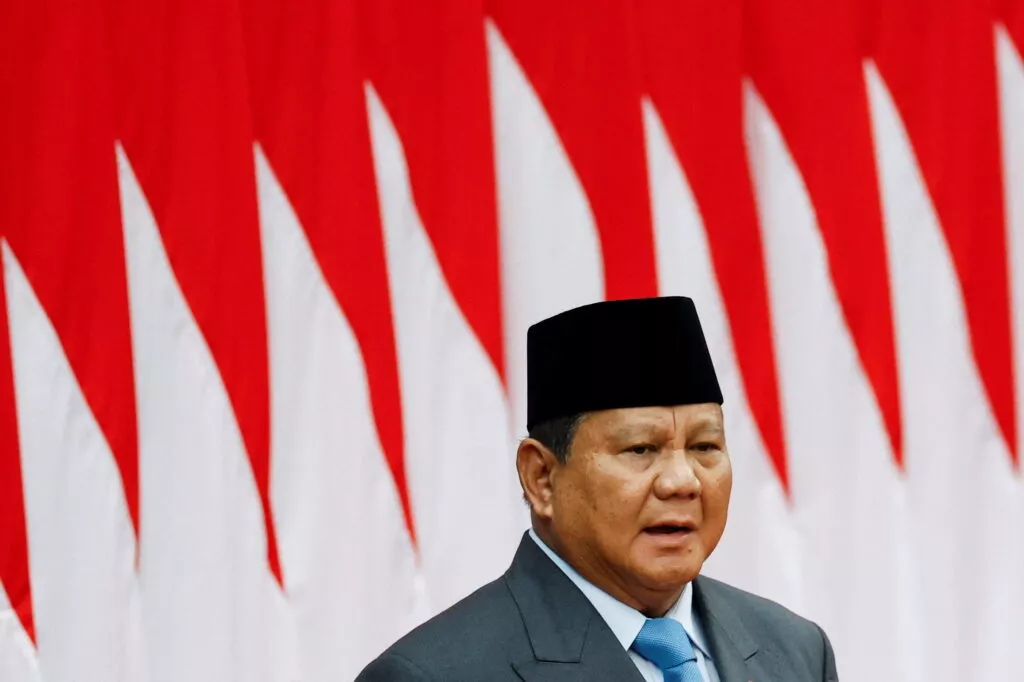
(Photo: East Asia Forum).
One year into his presidency, Indonesian President Prabowo Subianto has recast the tone of Indonesian politics. The Jakarta Post’s headline ‘Prabowo tightens grip, redraws political map’ captured his aim of transformative governance. Its editorial board described a presidency of ‘ambition without reform’, while an accompanying op-ed warned that his actions echo former Indonesian president Suharto’s paternal authoritarianism, emerging as Indonesia’s new ‘smiling general’ as he frames command as compassion.
Prabowo’s first year was choreographed through both policy and performance. In October 2025, he delivered three carefully sequenced speeches tracing his governing philosophy of discipline, compassion and continuity. On 5 October, at the 80th anniversary of the Indonesian National Armed Forces (TNI), he spoke as commander and moral guardian. On 18 October, he assumed the role of educator and benefactor at Universitas Kebangsaan Republik Indonesia (UKRI). On 20 October, from the State Palace, he presented himself as the patient steward of national unity. Together, these events revealed a presidency built on benevolent centralism — the fusion of affection and authority.
The UKRI ceremony was no ordinary campus visit, instead serving as a personalised national address just before the one year anniversary of his presidency. The venue itself embodied the message. UKRI, established by Prabowo’s family and managed by close allies from his Gerindra Party, blurs the line between public service and private virtue. Prabowo used this address as a platform to defend his flagship Free Nutritious Meals program, turning a welfare scheme into a parable of paternal leadership and recasting compassion as centralised responsibility.
The free meal program has become the moral and administrative core of his presidency. Designed to provide daily meals to students, toddlers and pregnant women, its centralised operation requires military and police involvement in its delivery. In the speech, Prabowo extolled the billions of servings provided by the program, emphasising its over 30 million beneficiaries since its launch in early 2025 while disregarding the thousands of reported cases of food poisoning. As Prabowo’s defining policy, the program symbolises his style of governance — expansive, paternalistic and hierarchically managed. The state feeds its children directly and through that act, commanding affection.
Behind this moral narrative lies an institutional project of consolidation. The government’s 2026 budget cuts have reduced regional transfers by nearly 20 per cent, prompting protests from governors warning of a return to fiscal dependency on Jakarta. Officials describe the policy as enforcing ‘discipline’, yet critics see it as recentralisation under the guise of efficiency.
Danantara, the state investment authority unveiled in February 2025, demonstrates the same impulse to command. Combining sovereign capital, state-owned enterprise assets and private co-investment, Danantara enables the executive to direct strategic projects with limited public scrutiny. The appointment of its chief operating officer — Dony Oskaria, Prabowo’s confidant — to head Indonesia’s state-owned enterprise regulator blurred the line between operator and overseer. This extends the presidency’s reach into corporate governance and recasts coordination as control.
Two weeks before the UKRI speech, Prabowo addressed the TNI anniversary parade, declaring that the military’s role was ‘no longer only to defend, but to build and nurture’, including through participation in free school meal program kitchens, medical logistics and agricultural projects under what he termed ‘people’s defence’. This rhetoric of discipline as compassion reveals the moral-military logic at the heart of Prabowo’s administration, where welfare delivery becomes a national security exercise.
Much of this conviction found vindication in the aftermath of the late-August unrest that engulfed Jakarta and other cities and resulted in 10 deaths. Prabowo quickly and decisively deployed funds to victims and deployed security forces on the streets in a two-pronged effort to quell the unrest.
On 20 October, Prabowo’s formal anniversary address from the Palace tied these threads of compassion and consolidation together. He praised former president Joko Widodo for ‘laying the foundations of progress’, promised to ‘continue what is good’ and invoked the need for ‘the state to be present everywhere’. The message was of continuity through moral renewal — a seamless transition from technocratic populism to what might be called paternal populism.
Prabowo again invoked the free meal program and lauded the TNI and police as ‘pillars of national care and discipline’. His tone combined reassurance and command, the same balance that underpins his governing method — welfare as loyalty, stability as affection.
But economic headwinds persist. Growth remains below the 8 per cent target and the much-touted foreign policy ‘charm offensive’ risks strategic incoherence. Yet domestically Prabowo has achieved what he most desired — order.
Prabowo’s first year demonstrates how the architecture of control can be rebuilt through the language of virtue. His speeches, policies and media strategy construct a moral narrative of unity — the army feeds the people, the president cares for the young and dissent is noise in an otherwise harmonious household. The ‘smiling general’ returns, not in uniform but through rhetoric — the paternal face of a recentralised republic.
Indonesia’s post-Suharto Reformasi is hanging by a thread in practice. The decentralised democracy born in 1998 has yielded to a centripetal order in which loyalty flows upward, sanctified by delivery and discipline. If Jokowi normalised centralisation through pragmatism, Prabowo is sanctifying it through care and loyalty. With Prabowo according Suharto as a national hero, Indonesia again finds being ruled by a smiling general — this time by one who governs not by overt coercion, but through the moral comfort of command.*
Adi Abidin is Public Policy Specialist at Kiroyan Partners and Research Fellow at Populi Center.
Source: East Asia Forum, November 26, 2025.
Download the clipping here.



